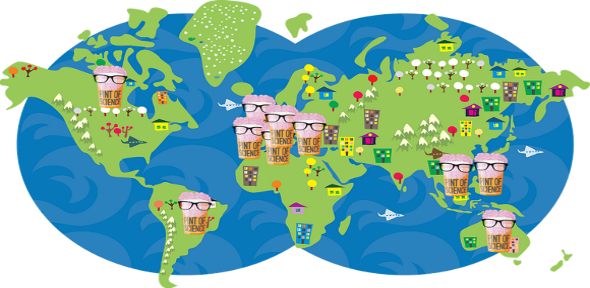
Submitted by Administrator on Thu, 20/07/2017 - 16:44
Pint of Science 2017: Mother Nature is Trying to Kill Me !
Posted : 15 June 2017
It’s no secret that a lot of things in nature want to kill you. But what if some of the deadliest assassins can’t be seen? What if we depend on some of these microorganisms? How will the arms race between man and infectious disease shape our future? And will we survive? Dr Simon Frost, Dr Barbara Blacklaws and Dr Derek Smith engaged with the public (and beer) at the Cambridge Brewhouse as part of the annual Pint of Science festival.
The main Pint of Science festival is over for 2017. We held nearly 450 events over 15-17 May across 26 cities in the UK! We'll be back with hundreds of events in May 2018. This year the CID team attracted a sold out public event of 70 people, at an evening sponsored by the magazine Science.
If you would like to volunteer to take part in 2018, please email the Coordinator.
Read more about Pint of Science
Where do infectious diseases in humans come from?
Dr Simon Frost (Researcher and Lecturer in the Department of Veterinary Medicine)
Many major infectious diseases of humans may be relatively young in evolutionary terms, causing epidemics only when humans first started to farm and form larger settlements around 12,000 years ago. Where did these diseases come from? I will discuss how diseases may have spilled over from wildlife and livestock, and how such 'zoonoses' continue to present a public health risk. Many insights can be gained from exploring samples obtained from long ago, including into the early spread of the Black Death and leprosy.

Gut Microorganisms - What they do for us
Dr Barbara Blacklaws (Senior Lecturer in Molecular Virology, Department of Veterinary Medicine)
Our intestines are home to many microorganisms that are intimately involved in our state of health. For example, it has long been clear that bacteria help in food digestion. Recently, many more complex interactions with gut cells and the immune system have been uncovered. Similarly, viruses may not be the nasty parasites we often perceive them to be. I shall discuss the interplay between intestinal microorganisms and our own cells and how this may be both beneficial and harmful.

Pandemic research, the flu and you.
Professor Derek Smith (Head of the Centre for Pathogen Evolution)
The 1918 global flu pandemic wiped out around 50 million people. In the last 300 years there have been around three flu pandemics every century. We must constantly be on alert for the next one. Global efforts to understand how pandemics are caused, will help us mitigate and even prevent future pandemics. I will discuss my work on how pathogens evolve, to what extent this evolution is predictable, and how it may help to determine public and animal health measures against such ever-changing pathogens.

